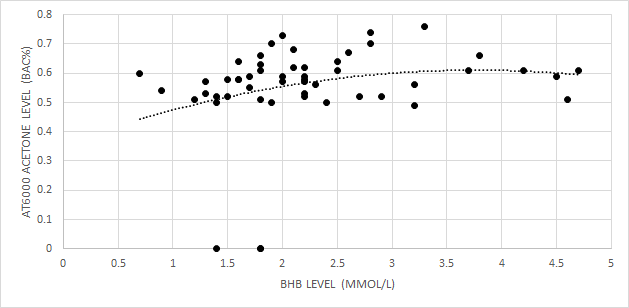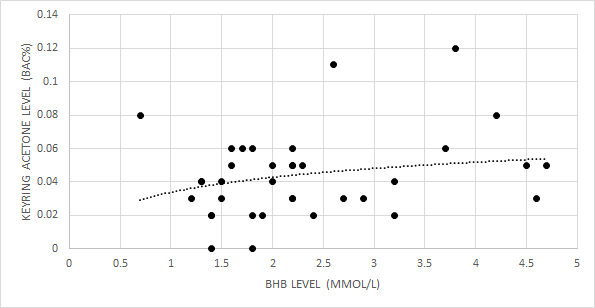I have been collecting some data over the course of the last 1 /12 months and measuring my breath and blood ketones. Since I don’t own a Ketonix,I used the AT6000 (https://www.amazon.de/gp/product/B01MQGBVB8/ref=oh_aui_detailpage_o03_s00?ie=UTF8&psc=1) and the Keychain (https://www.amazon.de/gp/product/B00IVFS01W/ref=oh_aui_detailpage_o03_s00?ie=UTF8&psc=1) breathalyzer for the acetone assessment. The correlation between the two is high (.65) but not perfect. Thus, I two different bivariable graphs to show the β-Hydroxybutyrate’s (BHB) relationship with my breath readings.
Overall, I collated 52 data points (so far—I will keep gathering data) every morning immediately after getting up. This makes for sufficient data to be somewhat statistically significant. I also collected my calorie and macro intake for the time. I will cross-reference them with this data at another time—this also should reveal some interesting patterns!
General data properties:
-
AT6000-measured acetone vs. BHB = 0.218516
-
Keychain-measured acetone vs. BHB = 0.269507
-
Average BHB = 2.259615
Here are the corresponding graphs for the AT6000 and the keychain device:


Some thoughts on this:
-
Overall I think Jimmy Moore is right: there seems to be little point in trying to correlate breath and blood ketones as they are different ketone bodies.
-
Yet the correlation is surprisingly high if you consider the following idea: BHB is the storage of ketone bodies in your blood ready to be used, while acetone is more an indicator of what is being used at the moment of measurement. Then, you could even pose the hypothesis, that there is a negative relationship between the ketone bodies.
-
I’ve noticed some pattern: If a ate many calories and much fat the day prior to measuring (> 4000-5000 Cals, 80-85% fat, which is my usual ratio), BHB and acetone tend to correlate more strongly, that is I am using and storing ketones at the same time. When I am fasting, blood ketones tend to be high while acetone tanks (usually after 24 hours). If I ate regularly the day before (< 3000Cals, 80-85% fat), acetone is usually higher than the BHB value would give away. I am still looking for an explanation of this pattern
-
The usual grain of salt: it’s just N=1, folks!
